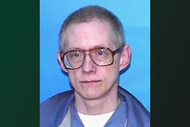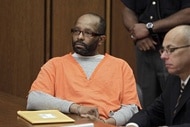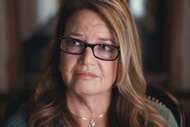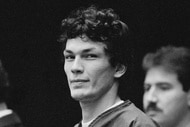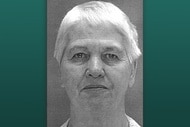Create a free profile to get unlimited access to exclusive videos, breaking news, sweepstakes, and more!
Ted Bundy's Girlfriend Elizabeth Kloepfer Narrowly Avoided Being Murdered By Him
Ted Bundy’s longtime love Elizabeth Kloepfer almost made it onto his list of victims one night, as she wrote in her book "Phantom Prince."

For years, Elizabeth Kloepfer considered Ted Bundy her lover, but one chilly night in Seattle he almost became her killer as well.
While the women closest to Bundy managed to avoid his homicidal rages, the notorious killer admitted after his final arrest in Florida that Kloepfer had almost made his list of victims, according to Kloepfer's book “The Phantom Prince: My Life with Ted Bundy.”
The out-of-print book, written by Kloepfer under the pen name Elizabeth Kendall, gives readers a rare glimpse into the intimate relationship the pair shared from 1969 until his final arrest for the mass murder of multiple women at a Florida sorority house in 1978. Oxygen.com tracked down the book, published in 1981 (and the basis for the Netflix film "Extremely Wicked, Shockingly Evil and Vile"), to learn more about Bundy’s life and relationships behind closed doors.
Kloepfer describes an affectionate relationship between the pair with few indications that the charismatic law school student could have been capable of such horrific acts of violence.
But while she considered her boyfriend to be “warm and loving” most of the time, there were moments where his unchecked rage spilled out.
The pair began dating in 1969 after meeting in a bar, and often spent their days taking her young daughter to the park, dining on steak dinners, or visiting the local beaches. They made love “every chance” they got and went window shopping together while strolling through the university district as the relationship between the couple began to grow.
“It was a happy time,” she wrote.
But there were also cracks in the relationship.
Bundy would often disappear for days at a time — sometimes admitting to being with other women —throughout the course of their relationship. These disappearances and frequent arguments between the couple would leave Kloepfer, a self-described alcoholic, feeling self-conscious and insecure.
“One night we finally talked about our future and assured each other that we’d stay together,” Kloepfer wrote after Bundy had decided to move to Utah to attend law school. “But even then, I suspected that we were saying these things to each other because neither of us was willing to face the truth: that Ted was bored with me; that I was socially inadequate for the political circles he traveled in; that he would soon be looking for someone new.”
Kloepfer also detailed several incidents in the book where Bundy’s anger was on full display, including a rafting trip they made to the lake one July Saturday.
They had taken their rubber raft to the Yakima River and planned to spend the day floating down the river. They idyllically drifted along sipping on cold beer, for most of the afternoon. But when Kloepfer was sitting on the edge of the raft staring off into the distance, she was suddenly shoved into the water.
“Ted lunged at me, put his hands on my shoulders and pushed me into the river. The plunge into the icy water took my breath away. I came up sputtering and grabbed the rope on the edge of the raft, too dazed for the moment to do more than hang on,” she wrote. “I looked up at Ted and our eyes locked. His face had gone blank, as though he was not there at all.”
After she returned to the raft, Bundy told her it was “no big deal” and it had been a joke, but the pair would argue about what had happened the rest of the way home, she said.
Sometime later, she would discover that Bundy — who regularly stole items to be able to live a more lavish lifestyle than he could afford — had taken a new television, new stereo, and new typewriter to furnish his apartment.
After seeing the items, Kloepfer blurted out, “You’re nothing but a thief.”
Bundy grabbed her arm and told her, “If you ever tell anyone about this, I’ll break your f---ing neck,” she wrote in the book.
But while the incident had frightened her, later that night he came to her apartment crying and told her he didn’t know why he had stolen the items.
She would also recount an incident when Bundy hit her during an interview with Randy Hergesheimer of the King County Police.
“I was embarrassed but I told Hergesheimer about the only time Ted had hit me,” she wrote. “It was early in our relationship and I was drunk. I couldn’t remember what we were arguing about but I kept telling Ted to ‘go ahead and hit me. Go ahead!’ Finally he slapped me.”
Despite these frightening incidents, as police began to suspect Bundy was responsible for the grisly murders of young women in Washington and Utah, she still had trouble reconciling the murderer police were describing with the man she was in love with.
“He was not a violent person,” she wrote. “When we argued he was always calm and reasonable; I was the one who lost control and yelled. I could count on the fingers of one hand the times that Ted had lost his temper since I’d known him.”
But it wasn’t until Bundy’s final arrest in Florida that he admitted he had tried to do something much more deadly while they were dating.
After calling her from jail, Bundy told Kloepfer he had tried to kill her one chilly night in Seattle as she was sleeping on a hide-a-bed in front of the fireplace. While she was asleep, he had closed the damper on the fireplace so that the smoke couldn’t escape out of the chimney, then put a towel under the crack in the door and went home.
“I remembered that night well. I’d been pretty drunk by the time we climbed into the hide-a-bed in front of the fireplace,” she wrote. “I woke up briefly as Ted was leaving, and he told me he was going back to his house to get his fan because the fireplace was backed up.”
She pulled the covers over her head and went back to sleep, before realizing she couldn’t breathe.
“My eyes were running and I was coughing. I jumped out of bed and threw open the nearest window and struck my head out,” she said. “After I had recovered some, I opened all the windows and the doors and broke up the fire the best I could.”
Bundy never returned that night.
During the jail house phone call, Kloepfer asked Bundy whether he used her to “touch base with reality” after committing his murders by reaching out to her.
“Yeah, that’s a pretty good guess,” he told her, before describing a “force” that would push him to commit the dark deeds.
“He told me that he was sick and that he was consumed by something that he didn’t understand and that, um, that it — that he just couldn’t contain it,” Kloepfer would say in an interview with investigators played in the recent Netflix docu-series "Conversations with A Killer: The Ted Bundy Tapes" (directed by Joe Berlinger, the same director of "Extremely Wicked"). “He spent so much time trying to maintain a normal life and he just couldn’t do it. He said that he was preoccupied with this force.”
This force, sometimes referred to as an “entity,” supposedly drove Bundy to hunt and attack young women across the country, killing dozens of women in California, Oregon, Washington, Idaho, Utah, Colorado, and Florida in the 1970s.
On the night he had attempted to take Kloepfer’s life, Bundy told her he had been “really trying hard to control it” and had been staying off the streets and “trying to feel normal” but that the force had suddenly taken over.
According to him, “It just happened that I was sleeping with you at your house when I felt it coming on.”
The full extent of Bundy’s crimes may still not be known, as the prolific serial killer was executed in 1989.
Kloepfer’s book serves as the inspiration for Berlinger’s fictionalized film “Extremely Wicked, Shockingly Evil And Vile” which stars Zac Efron as Bundy and Lily Collins as Kloepfer. It beings streaming on Netflix Friday.

